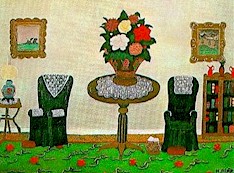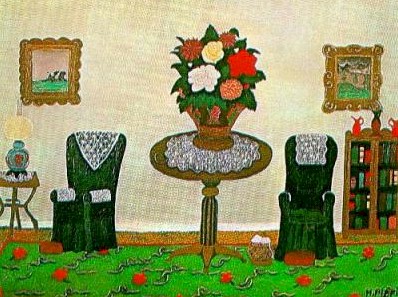|
HOW TO DESCRIBE A PLACE |
|
Look at this picture, Victorian Interior by
Horace Pippin: |
|
 |
|
Imagine now that the room in the picture has
played an important part in your life. In your autobiography you
want to describe your first impressions of the room. |
|
This 3-step guide to descriptions can be useful
for you: |
|
STEP 1: GETTING IDEAS |
|
Your description of the room is going to include: |
|
- what you saw, including colours
- what you heard, smelled and touched
- your feelings |
|
Look at the picture carefully for a few moments. You were there a long time ago,
but you have never forgotten it. Is it a pleasant or unpleasant memory? Or are
your feelings mixed? |
|
Now write some brief notes about all the sights, colours, sounds, smells,
textures and feelings that you 'remember'. |
|
Adjective and noun combinations are
best. For example: old-fashioned furniture; hard scratchy chair covering;
strong smell of polish, etc. |
|
STEP 2: FINDING A FOCUS |
|
FEELINGS |
|
Do the adjectives you have written reflect your feelings about the room? For
example, have you written heavy old-fashioned furniture or elegant antique
furniture? Think of one word or short phrase which sums up your 'memories'. For
example, for mainly unpleasant feelings the word could be uncomfortable;
and for
mainly pleasant feelings the word could be safe. |
|
PATH |
|
Now organise the different parts of your description. Imagine your words
following the path of a movie camera. For example, start with a general view and
then move to take in selected details in close-up; or start with a detail and
gradually build up a wider impression. |
|
STEP 3: WRITING |
|
Here are two possible descriptions of the room
which can help you write. Read them
and decide in each case what the writer's focus is. For your comfort, we have
enlarged the picture above. |
 |
|
VERSION 1 |
VERSION 2 |
|
The first thing I noticed about the room was its warmth and light. A gently
hissing oil lamp brought out the cheerful red and gold in the carpet. The
furniture was old, but it looked solid and comfortable. Everything had been
newly dusted and polished, and the clean smell of polish mixed with the scent of
freshly cut flowers. There were some well-used books in a bookcase and a basket
of knitting on the floor. This was a room where people could relax after a hard
day's work. |
The first thing I noticed about the room was a stiffly arranged vase of
flowers, and a strong hospital smell of disinfectant and polish. The vase was
exactly in the middle of a white lace tablecloth on a round table. On either
side of the table there were two old-fashioned brown chairs. Behind each chair
there was a gloomy picture in a heavy frame. I did not dare to touch anything in
case I made a dirty mark or moved something from its correct position. The only
sounds in the room were the little rustling noises I made as I tried to find a
comfortable position in one of the hard scratchy chairs. It was not a room to
relax in. |